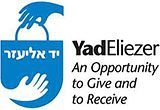
Yad Eliezer, Website Re-development, Israel
Yad Eliezer is a Jerusalem- based organization that provides food and financial assistance to over 50,000 people in seventeen cities across Israel. Yad Eliezer is most known for the monthly food baskets of staples such as eggs, flour, sugar, and canned goods that it supplies to 6,000 families, but the organization has thirteen programs in all, ranging from providing baby formula to sponsoring weddings for needy couples to its Big Brother program. Donations to Yad Eliezer typically go to directly to food for meal or holiday packages.
Targum Shlishi specified that the majority of its current funding go to website improvements in an effort to improve the organization’s ability to market itself, publicize its programs, and build on its fundraising initiatives. Yad Eliezer’s website had launched in November 2002 and although it helped the organization raise funds, it was not interactive and not as effective as it could be. Among planned improvements for the website are the addition of an interactive section for the Big Brother program, an interactive calendar for the “Adopt a Wedding” program, a calendar of upcoming fundraising drives and events, an online fundraising auction, and posting of informational videos on Yad Eliezer and on the Big Brother program. In addition to funding website improvements, Targum Shlishi also provided support for food donations.

New Voices (Jewish Student Press Service), Israel Correspondence Program, New York
New Voices is a national magazine written by and for Jewish college students and is read by nearly 10,000 students on over 300 campuses in the US. It has been published since 1991 by the independent, non-profit, student-run Jewish Student Press Service and affords an opportunity for young Jewish journalists to both engage with Jewish issues and develop their journalistic careers. Targum Shlishi’s funding supports the Israel Correspondence Program by compensating the magazine’s several Israel correspondents for their time and their research expenses.
New Voices has recently published several Israel-related pieces, including a forum on Birthright and other youth trips to Israel. “Targum Shlishi has made possible one of the most fundamental aspects of New Voices’ editorial mission: to allow students to engage with Israel and Israel-related issues in their own words and on their own terms,” said Miriam Felton-Dansky, director of the Jewish Student Press Service. “Because of the Israel correspondents that Targum Shlishi has made possible, students from across the country are learning about Israel from their peers and engaging in open debate about the issues they care about most.”
Click here for an excerpt from New Voices.
Jerusalem Project for Democracy in the Middle East, “Virtual Think Tank,” Jerusalem
Established in 2003, the Jerusalem Project for Democracy in the Middle East “Virtual Think Tank” is an online think tank where scholars present papers on issues related to the Arab-Israeli conflict and hopes for a peaceful coexistence. These ideas are disseminated to readers and listeners worldwide through both multimedia presentations and radio interviews, in cooperation with the Jerusalem Post. The website has a forum where readers can send feedback and discuss how these issues impact the development of democratic thinking that could lead toward resolution of the conflict. The think tank provides in-depth exploration of issues that ordinarily would not be presented to the public at large. Targum Shlishi provided seed funding for this project. “Targum Shlishi has created an opportunity for high level thinking on critical issues in Israel and the Middle East by stimulating discussion and presenting important views by major scholars and public figures in Israel,” said Irwin J. Mansdorf, PhD, director of the Jerusalem Project.
The project launched in 2004 with three papers: “Israel’s Security Obsession: Prudence and Precaution or Unwarranted Fear?” by Maj.-Gen. (ret.) Yaakov Amidror, “Territorial Exchange within the Framework of an Israeli-Palestinian Peace Agreement” by Dr. Mordechai Kedar, and “The Geneva Accord: Mellifluous Music, Miserable Lyrics” by Dr. Joshua Teitelbaum.
Click here for an excerpt from
the Virtual Think Tank.

